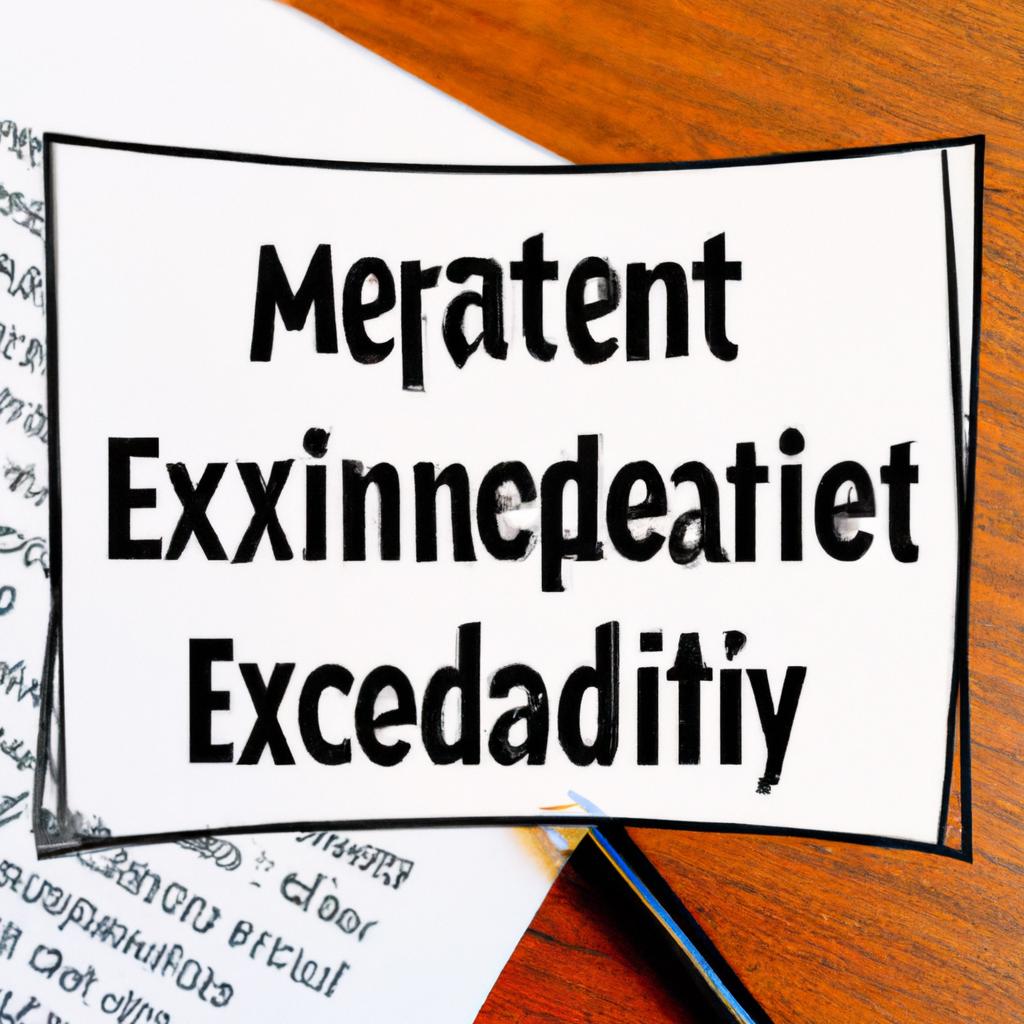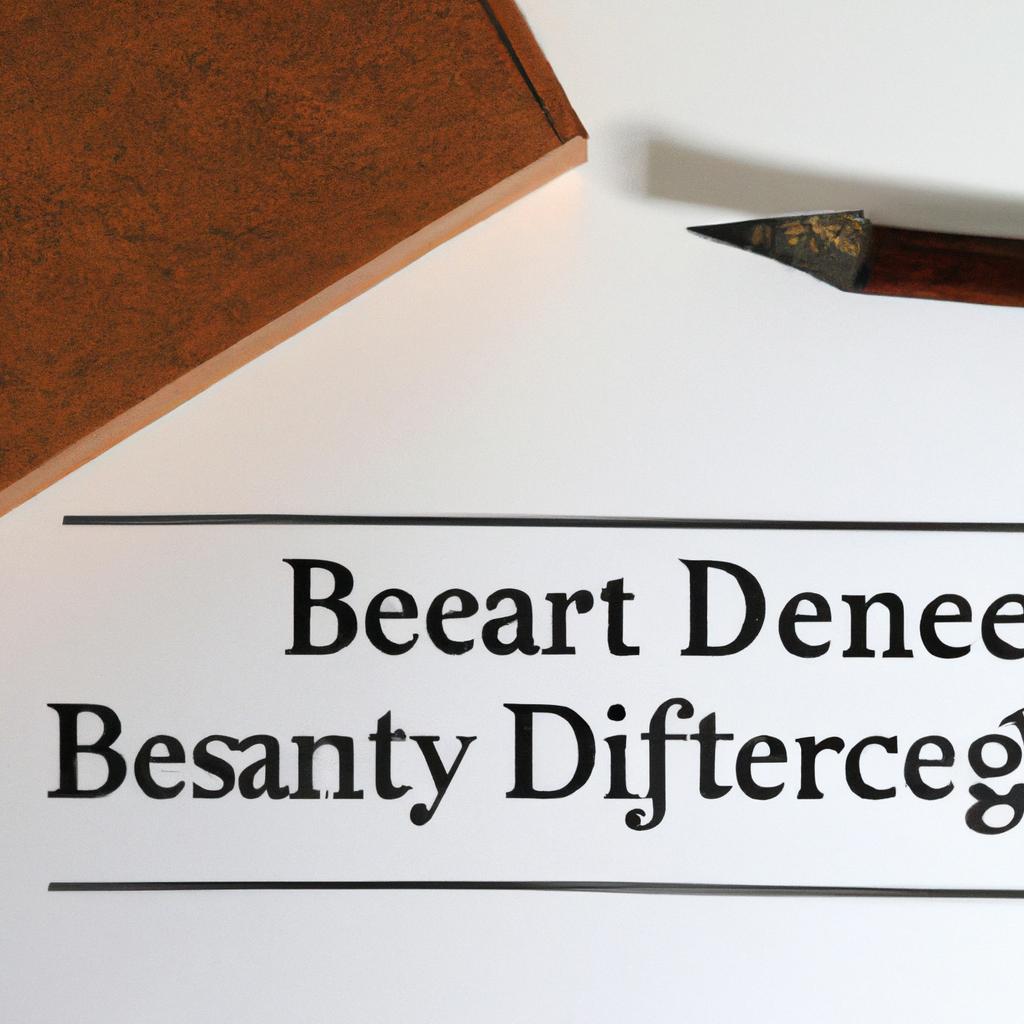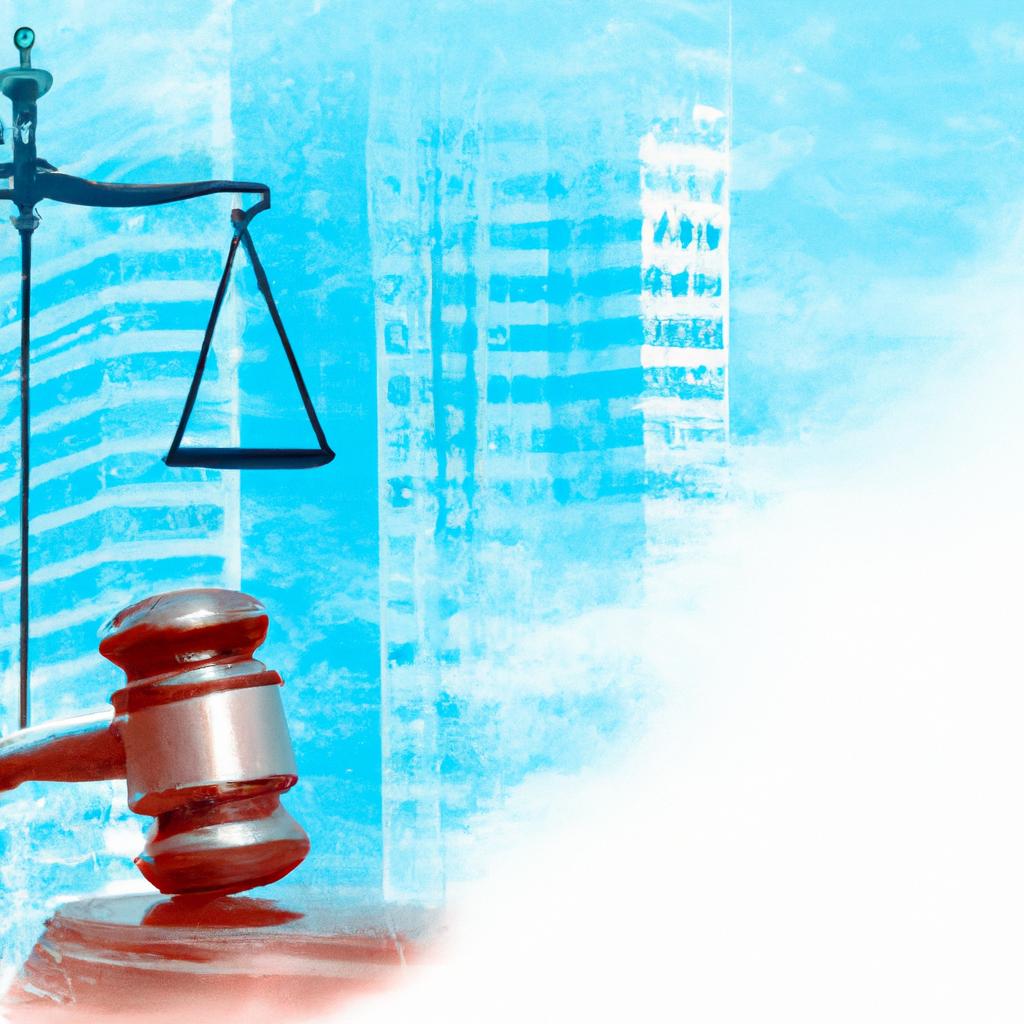In the intricate tapestry of estate planning and asset distribution, the beneficiary deed shines as a strategic tool that allows individuals to pass on their real property directly to designated recipients upon their passing. As seasoned practitioners in the realm of legal matters concerning estates, Morgan Legal Group, based in the bustling metropolis of New York City, is well-versed in the nuances of beneficiary deeds and their implications. In this article, we delve into the intricacies of beneficiary deeds, shedding light on their benefits and potential pitfalls for those considering incorporating this instrument into their estate planning endeavors.
Understanding the Purpose and Benefits of a Beneficiary Deed
When planning for the future and considering how to ensure your assets are passed on to your loved ones efficiently, it is important to understand the purpose and benefits of a beneficiary deed. A beneficiary deed, also known as a transfer-on-death deed, is a legal document that allows you to designate who will inherit your real estate property upon your death. This deed is a valuable tool in estate planning as it can help avoid the lengthy and costly probate process.
One of the key benefits of a beneficiary deed is that it allows for a seamless transfer of property to your chosen beneficiaries without the need for court involvement. This can provide peace of mind knowing that your property will be distributed according to your wishes. Additionally, a beneficiary deed is revocable, meaning you can make changes to the document at any time during your lifetime. This flexibility allows you to adjust your estate plan as needed to accommodate any changes in your circumstances or relationships.

Key Considerations When Establishing a Beneficiary Deed
When establishing a beneficiary deed, there are several key considerations to keep in mind to ensure that your assets are distributed according to your wishes. One important factor to consider is choosing the right beneficiaries. It’s crucial to carefully select individuals who you trust to receive your assets upon your passing. Make sure to update your beneficiary designation regularly to account for any life changes such as marriages, divorces, or deaths in the family.
Another important consideration is understanding the potential tax implications of a beneficiary deed. While beneficiary deeds can help avoid the probate process, they may have estate tax consequences depending on the value of the assets being transferred. Consult with a knowledgeable estate planning attorney to fully understand the tax implications and ensure that your beneficiary deed is structured in a tax-efficient manner. Remember, proper planning can help protect your assets and ensure a smooth transfer to your chosen beneficiaries.
| Beneficiary Deed Considerations: |
|---|
| Choose trusted beneficiaries |
| Update beneficiary designations regularly |
| Understand tax implications |

Maximizing the Efficiency and Effectiveness of a Beneficiary Deed
When it comes to , there are several key strategies to keep in mind. One important factor to consider is ensuring that the deed is properly executed and recorded to avoid any potential challenges or issues down the line. It is essential to work with a knowledgeable attorney who can guide you through the process and ensure that all legal requirements are met.
Another way to enhance the effectiveness of a beneficiary deed is to regularly review and update the beneficiary designation as needed. Life changes such as marriages, divorces, births, and deaths can impact your estate plan, so it is important to regularly revisit and revise your beneficiary designations to reflect any changes in your circumstances. By staying proactive and attentive to your beneficiary deed, you can ensure that your wishes are carried out effectively and efficiently.

Recommendations for Incorporating a Beneficiary Deed into Your Estate Planning Strategy
When considering estate planning strategies, incorporating a beneficiary deed can be a valuable tool to ensure the smooth transfer of assets to your loved ones upon your passing. A beneficiary deed, also known as a transfer-on-death deed, allows you to designate beneficiaries who will automatically receive the property upon your death, bypassing the probate process. This can provide a quick and efficient way to transfer real estate assets to heirs without the need for court involvement.
One key recommendation for incorporating a beneficiary deed into your estate planning strategy is to ensure that the deed is properly executed according to state laws. Each state has specific requirements for creating a valid beneficiary deed, including the need for the deed to be signed, notarized, and recorded with the county recorder’s office. Additionally, it is important to keep the deed updated as life circumstances change, such as the birth of new children or grandchildren, marriages, divorces, or deaths. By regularly reviewing and updating your beneficiary deed, you can ensure that your wishes are accurately reflected and your loved ones are protected.
Q&A
Q: What is a beneficiary deed?
A: A beneficiary deed is a legal document that allows an individual to designate who will inherit their real property after they pass away.
Q: How does a beneficiary deed differ from a will?
A: A beneficiary deed allows for the transfer of real property outside of the probate process, while a will must go through probate to be executed.
Q: Can a beneficiary deed be changed or revoked?
A: Yes, a beneficiary deed can be changed or revoked at any time by the individual who created it.
Q: Are there any restrictions on who can be named as a beneficiary on a beneficiary deed?
A: There are typically no restrictions on who can be named as a beneficiary on a beneficiary deed, but it is important to consult with a legal professional to ensure the deed is legally valid.
Q: What are the advantages of using a beneficiary deed?
A: Some advantages of using a beneficiary deed include avoiding probate, maintaining privacy, and ensuring a smooth transfer of real property to a designated beneficiary.
Q: Are there any downsides to using a beneficiary deed?
A: Some potential downsides of using a beneficiary deed include limitations on the ability to control how the property is distributed and the possibility of complications if the beneficiary predeceases the individual creating the deed.
Q: Is a beneficiary deed the right choice for everyone?
A: A beneficiary deed may be a good option for individuals who want to avoid probate and have a clear plan for the transfer of their real property, but it may not be the best choice for everyone. It is important to consider individual circumstances and seek guidance from a legal professional when creating a beneficiary deed.
To Conclude
In conclusion, a beneficiary deed is a powerful tool for ensuring that your property passes smoothly to your chosen heirs without the need for probate. By designating beneficiaries on your deed, you can provide peace of mind knowing that your wishes will be carried out efficiently and effectively. Whether you are a homeowner or real estate investor, considering a beneficiary deed as part of your estate planning strategy can streamline the transfer of property and simplify the inheritance process for your loved ones. Take the time to explore this option and see how it can benefit you and your heirs for years to come.
 Understanding Beneficiary Deeds: All You Need to Know
Understanding Beneficiary Deeds: All You Need to Know
In this day and age, it is crucial to have a plan in place for your estate and assets. Beneficiary deeds have become a popular and effective way to transfer property to your chosen beneficiaries. It is a simple and cost-effective alternative to wills and trusts, providing clarity and peace of mind for both the grantor (property owner) and the beneficiary.
In this comprehensive guide, we will discuss what a beneficiary deed is, how it differs from other estate planning methods, the benefits of using one, and practical tips for creating one.
What is a Beneficiary Deed?
A beneficiary deed, also known as a transfer-on-death deed, is a legal document that allows a property owner to transfer their real estate to a designated beneficiary upon their death. The designated beneficiary can be an individual, a trust, or an organization.
It is a revocable document, meaning the owner can change or revoke the beneficiary designation at any time during their lifetime. It is also not subject to probate or court approval, making it a swift and private way to transfer property.
Beneficiary deeds are recognized in several states, including Arizona, Colorado, Nevada, New Mexico, Montana, and Wyoming. Each state has its own laws and requirements, so it is essential to consult with a legal professional who is well-versed in your state’s laws.
How Does it Differ From a Will or a Trust?
Beneficiary deeds function similarly to wills and trusts, but there are some key differences that make them a preferred method of transferring property. Here are the main ways that beneficiary deeds differ from wills and trusts:
1. Probate Process
The probate process is a legal procedure in which the court determines the validity of a will and oversees the distribution of assets. It can be time-consuming, costly, and open to public scrutiny.
With a beneficiary deed, the property automatically transfers to the designated beneficiary upon the grantor’s death, bypassing the probate process altogether. This saves time and reduces the expenses associated with probate.
2. Ability to Change or Revoke
Wills and trusts are typically considered irrevocable upon the grantor’s death. However, beneficiary deeds can be changed or revoked at any time during the grantor’s lifetime.
This flexibility allows the owner to update their beneficiary designation as needed, depending on their circumstances and relationships with their beneficiaries.
3. Distribution of Property
Wills and trusts provide detailed instructions for the distribution of assets, including property. On the other hand, beneficiary deeds only transfer the property to the designated beneficiary without any specific instructions on how it should be used.
This gives the beneficiary more freedom and control over how they want to use or sell the property.
Benefits of Using a Beneficiary Deed
There are several benefits to using a beneficiary deed as part of your estate planning. These include:
1. Avoiding Probate
As mentioned earlier, beneficiary deeds bypass the probate process, saving time and money. It also ensures that the property transfer is a private matter, not open to public records.
2. Ensuring Property Goes to Intended Beneficiary
A beneficiary deed allows the owner to choose specific individuals, organizations, or trusts as their beneficiaries. This ensures that the property is transferred to the intended recipient without any disputes or legal challenges.
3. Flexibility and Control
The revocable nature of beneficiary deeds gives the owner control over their property even after their death. They can change or revoke the designation at any time during their lifetime, providing flexibility in their estate planning.
Practical Tips for Creating a Beneficiary Deed
1. Choose the Right Beneficiaries
When creating a beneficiary deed, it is essential to carefully consider who you want to leave your property to. Be sure to discuss it with your loved ones and seek legal advice to ensure your beneficiaries are designated correctly.
2. Consult with an Attorney
While beneficiary deeds are relatively straightforward and easy to create, it is crucial to consult with an attorney who specializes in estate planning. They can guide you through the process and ensure that the deed complies with state laws and meets your specific needs.
3. Keep the Deed Safe and Accessible
Once your beneficiary deed is created, it is essential to keep it in a safe and accessible place. Let your beneficiaries know where the deed is located, and consider keeping a copy with your attorney or a trusted family member.
Conclusion
In conclusion, beneficiary deeds are an effective and hassle-free way to transfer property to your chosen beneficiaries. It offers flexibility, control, and avoids the lengthy and costly probate process.
However, it is essential to consult with an attorney who is well-versed in your state’s laws to ensure your beneficiary deed is valid and meets your specific needs. Choose your beneficiaries carefully, and make sure your deed is kept safe and accessible for when the time comes. With a beneficiary deed, you can have peace of mind knowing that your property will be transferred to your loved ones according to your wishes.

